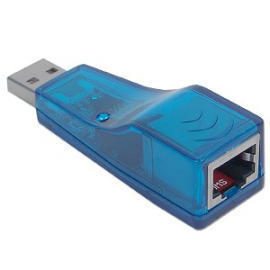In another article I've shown how, this USB Ethernet adapter, appears on my desktop system.
Today I'm going to show you how it works on the Raspberry Pi and on the Beaglebone board.
It's really fantastic, it works fine without any problem.
Take a look a the following outputs:
Beaglebone running Angstrom Linux
Once the adapter has been plugged in the usb port it is immediately visible using the lsusb command:
root@beaglebone:/root/# lsusb
Bus 001 Device 001: ID 1d6b:0002 Linux Foundation 2.0 root hub
Bus 001 Device 002: ID 0b95:772a ASIX Electronics Corp.
Bus 002 Device 001: ID 1d6b:0002 Linux Foundation 2.0 root hub
using the dmesg tool we can get some other info
[ 9.903625] asix 1-1:1.0: eth1: register 'asix' at usb-musb-hdrc.1-1, ASIX AX88772 USB 2.0 Ethernet, 00:0e:c6:f0:1e:d4
[ 9.903839] usbcore: registered new interface driver asix
[ 10.724822] ADDRCONF(NETDEV_UP): eth1: link is not ready
[ 205.999542] ADDRCONF(NETDEV_CHANGE): eth1: link becomes ready
[ 206.013153] asix 1-1:1.0: eth1: link up, 100Mbps, full-duplex, lpa 0xCDE1
[ 216.591796] eth1: no IPv6 routers present
[ 835.565032] ADDRCONF(NETDEV_UP): eth1: link is not ready
[ 911.676696] ADDRCONF(NETDEV_UP): eth1: link is not ready
[ 912.121734] ADDRCONF(NETDEV_CHANGE): eth1: link becomes ready
[ 912.123260] asix 1-1:1.0: eth1: link up, 100Mbps, full-duplex, lpa 0xCDE1
[ 922.351837] eth1: no IPv6 routers present
last i configured the device with my favorite IP
root@beaglebone:/root# ifconfig eth1 192.168.2.7 netmask 255.255.248.0
issueing the ifconfig command we can see that the board is "running"
root@beaglebone:/root/ # ifconfig
eth1 Link encap:Ethernet HWaddr 00:0E:C6:F0:1E:D4
inet addr:192.168.2.7 Bcast:192.168.7.255 Mask:255.255.248.0
inet6 addr: fe80::20e:c6ff:fef0:1ed4/64 Scope:Link
UP BROADCAST RUNNING MULTICAST MTU:1500 Metric:1
RX packets:4927 errors:0 dropped:0 overruns:0 frame:0
TX packets:7272 errors:0 dropped:0 overruns:0 carrier:0
collisions:0 txqueuelen:1000
RX bytes:463885 (453.0 KiB) TX bytes:8901118 (8.4 MiB)
lo Link encap:Local Loopback
inet addr:127.0.0.1 Mask:255.0.0.0
inet6 addr: ::1/128 Scope:Host
UP LOOPBACK RUNNING MTU:16436 Metric:1
RX packets:8 errors:0 dropped:0 overruns:0 frame:0
TX packets:8 errors:0 dropped:0 overruns:0 carrier:0
collisions:0 txqueuelen:0
RX bytes:504 (504.0 B) TX bytes:504 (504.0 B)
Raspberry Pi running raspbian
Once the adapter has been plugged in the usb port it is immediately visible using the lsusb command:
pi@raspberrypi ~ $ lsusb
Bus 001 Device 002: ID 0424:9512 Standard Microsystems Corp.
Bus 001 Device 001: ID 1d6b:0002 Linux Foundation 2.0 root hub
Bus 001 Device 003: ID 0424:ec00 Standard Microsystems Corp.
Bus 001 Device 004: ID 0b95:772a ASIX Electronics Corp. AX88772A Fast Ethernet
using the dmesg tool we can get some other info
[ 3.172166] usb 1-1.2: new high-speed USB device number 4 using dwc_otg
[ 3.295602] usb 1-1.2: New USB device found, idVendor=0b95, idProduct=772a
[ 3.304708] usb 1-1.2: New USB device strings: Mfr=1, Product=2, SerialNumber=3
[ 3.314116] usb 1-1.2: Product: AX88x72A
[ 3.320305] usb 1-1.2: Manufacturer: ASIX Elec. Corp.
[ 3.327380] usb 1-1.2: SerialNumber: 000002
last the output of the ifconfig command, the interface is eth1..
pi@raspberrypi ~ $ ifconfig
eth0 Link encap:Ethernet HWaddr b8:27:eb:f5:2a:a2
inet addr:192.168.2.7 Bcast:192.168.2.255 Mask:255.255.255.0
UP BROADCAST RUNNING MULTICAST MTU:1500 Metric:1
RX packets:351 errors:0 dropped:0 overruns:0 frame:0
TX packets:99 errors:0 dropped:0 overruns:0 carrier:0
collisions:0 txqueuelen:1000
RX bytes:25877 (25.2 KiB) TX bytes:11706 (11.4 KiB)
eth1 Link encap:Ethernet HWaddr 00:0e:c6:f0:1e:d4
UP BROADCAST MULTICAST MTU:1500 Metric:1
RX packets:0 errors:0 dropped:0 overruns:0 frame:0
TX packets:0 errors:0 dropped:0 overruns:0 carrier:0
collisions:0 txqueuelen:1000
RX bytes:0 (0.0 B) TX bytes:0 (0.0 B)
lo Link encap:Local Loopback
inet addr:127.0.0.1 Mask:255.0.0.0
UP LOOPBACK RUNNING MTU:16436 Metric:1
RX packets:0 errors:0 dropped:0 overruns:0 frame:0
TX packets:0 errors:0 dropped:0 overruns:0 carrier:0
collisions:0 txqueuelen:0
RX bytes:0 (0.0 B) TX bytes:0 (0.0 B)
The adapter works fine with both the boards.
That's all


